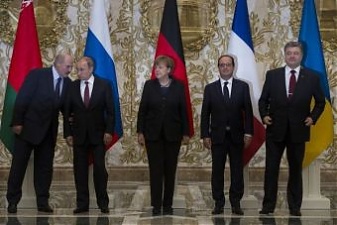Baltic States – CIS, EU – Baltic States, Legislation, Ukraine
International Internet Magazine. Baltic States news & analytics
Thursday, 12.02.2026, 07:21
Lithuanian president: long way to peace in Ukraine
 Print version
Print version |
|---|
| At the Minsk meeting. |
According to the president, the main issue – the control of the Ukrainian-Russian border – has not been resolved.
German, French, Russian and Ukrainian leaders decided to give Kiev the control of the Ukrainian-Russian border only after holding lawful municipal elections in the Donetsk and Luhansk area. It was also agreed that both Ukrainian and separatist forces will announce a ceasefire as of midnight of 14 February.
"I would like to say that it was only an agreement on a ceasefire. Peace is still far away, it is a long way to a complete solution of the problem," she said in Brussels.
In the view of the president, the European Union will probably postpone consideration of new sanctions against Russia until March. Grybauskaite is convinced that much will depend on Russia.
"Much will depend on the aggressor. In this case, Russia is the aggressor – we can state it openly without any euphemisms. It is only an agreement on a ceasefire, no agreement has been reached regarding the border control, which means that Russia as an aggressor will be able to infiltrate its forces (to Ukraine – Elta), including their military equipment, without any identifying tags and insignia – as it has been done up to now," the president said.
During a special press briefing yesterday, Latvian Foreign Minister Edgars Rinkevics (Unity) urged caution in assessing the results of the new Minsk agreements.
Rinkevics told members of the press that ''what was agreed in Minsk should be seen as a positive step''.
''We can certainly congratulate what was achieved today, and it looks like at the moment that a political agreement was also struck. However, the most important is that these agreements are actually implemented,'' the minister pointed out, adding that previous experience shows that there have been major problems in observing similar agreements which were reached in the past.
Rinkevics also said that the most important is for the first steps to be taken – the start of the ceasefire, and decentralization from both sides.
''I believe we should be cautious when looking at what was agreed upon in Minsk. We truly would like to see the agreements that have been reached to be implemented. At the same time, this is certainly not the end of this process,'' he emphasized, adding that there are many more matters which must be solved.
''I would also like to see the EU take a more serious stance in regard to strengthening Ukraine's economic and social systems. We are speaking about financial aid, as well as assisting with the country's reform process,'' the politician pointed out.
The AFP news agency reports that marathon talks in Belarus ended Thursday with a ceasefire announcement in the war between Ukraine and pro-Moscow rebels, but Germany's Chancellor Angela Merkel warned that "big hurdles" remained.
Russian President Vladimir Putin emerged from the summit in the Belarussian capital Minsk, saying he, Merkel, French President Francois Hollande and Ukrainian President Petro Poroshenko had agreed on the "main" points.
Putin said a ceasefire would take effect on Sunday and that heavy weapons would be withdrawn from frontlines of the conflict, which has already killed at least 5,300 people and driven a million people from their homes.
However, Merkel spoke only of a "glimmer of hope". "I have no illusions. We have no illusions," she said, adding that "much work" remained.
The latest talks were seen as a last opportunity for European leaders to save nearly bankrupt Ukraine from ever-widening defeats at the hands of rebels said by Kiev and the West to be armed and trained by Russia, the AFP writes.
Even as the deal was agreed, Kiev and rebel sources said fighting over the last 24 hours had killed 14 civilians and two Ukrainian soldiers.
The Ukrainian government also accused Russia of deploying another 50 tanks across the border overnight.








 «The Baltic Course» Is Sold and Stays in Business!
«The Baltic Course» Is Sold and Stays in Business!

